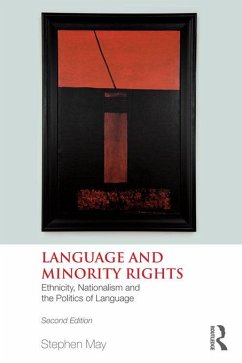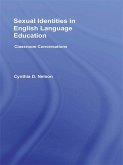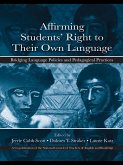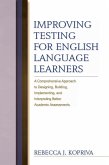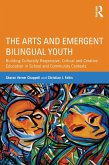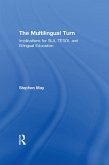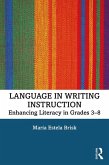Stephen May
Language and Minority Rights (eBook, PDF)
Ethnicity, Nationalism and the Politics of Language
50,95 €
50,95 €
inkl. MwSt.
Sofort per Download lieferbar

25 °P sammeln
50,95 €
Als Download kaufen

50,95 €
inkl. MwSt.
Sofort per Download lieferbar

25 °P sammeln
Jetzt verschenken
Alle Infos zum eBook verschenken
50,95 €
inkl. MwSt.
Sofort per Download lieferbar
Alle Infos zum eBook verschenken

25 °P sammeln
Stephen May
Language and Minority Rights (eBook, PDF)
Ethnicity, Nationalism and the Politics of Language
- Format: PDF
- Merkliste
- Auf die Merkliste
- Bewerten Bewerten
- Teilen
- Produkt teilen
- Produkterinnerung
- Produkterinnerung

Bitte loggen Sie sich zunächst in Ihr Kundenkonto ein oder registrieren Sie sich bei
bücher.de, um das eBook-Abo tolino select nutzen zu können.
Hier können Sie sich einloggen
Hier können Sie sich einloggen
Sie sind bereits eingeloggt. Klicken Sie auf 2. tolino select Abo, um fortzufahren.

Bitte loggen Sie sich zunächst in Ihr Kundenkonto ein oder registrieren Sie sich bei bücher.de, um das eBook-Abo tolino select nutzen zu können.
The Second Edition of this award-winning volume in the field of language rights and language policy is a timely and useful revision of its core arguments and examples, addressing new theoretical and empirical developments since its initial publication.
- Geräte: PC
- mit Kopierschutz
- eBook Hilfe
- Größe: 1.58MB
Andere Kunden interessierten sich auch für
![English as a Foreign Language in Saudi Arabia (eBook, PDF) English as a Foreign Language in Saudi Arabia (eBook, PDF)]() English as a Foreign Language in Saudi Arabia (eBook, PDF)40,95 €
English as a Foreign Language in Saudi Arabia (eBook, PDF)40,95 €![Sexual Identities in English Language Education (eBook, PDF) Sexual Identities in English Language Education (eBook, PDF)]() Cynthia D. NelsonSexual Identities in English Language Education (eBook, PDF)56,95 €
Cynthia D. NelsonSexual Identities in English Language Education (eBook, PDF)56,95 €![Affirming Students' Right to their Own Language (eBook, PDF) Affirming Students' Right to their Own Language (eBook, PDF)]() Affirming Students' Right to their Own Language (eBook, PDF)57,95 €
Affirming Students' Right to their Own Language (eBook, PDF)57,95 €![Improving Testing For English Language Learners (eBook, PDF) Improving Testing For English Language Learners (eBook, PDF)]() Rebecca KoprivaImproving Testing For English Language Learners (eBook, PDF)57,95 €
Rebecca KoprivaImproving Testing For English Language Learners (eBook, PDF)57,95 €![The Arts and Emergent Bilingual Youth (eBook, PDF) The Arts and Emergent Bilingual Youth (eBook, PDF)]() Sharon Verner ChappellThe Arts and Emergent Bilingual Youth (eBook, PDF)50,95 €
Sharon Verner ChappellThe Arts and Emergent Bilingual Youth (eBook, PDF)50,95 €![The Multilingual Turn (eBook, PDF) The Multilingual Turn (eBook, PDF)]() The Multilingual Turn (eBook, PDF)50,95 €
The Multilingual Turn (eBook, PDF)50,95 €![Language in Writing Instruction (eBook, PDF) Language in Writing Instruction (eBook, PDF)]() María Estela BriskLanguage in Writing Instruction (eBook, PDF)40,95 €
María Estela BriskLanguage in Writing Instruction (eBook, PDF)40,95 €-
-
-
The Second Edition of this award-winning volume in the field of language rights and language policy is a timely and useful revision of its core arguments and examples, addressing new theoretical and empirical developments since its initial publication.
Hinweis: Dieser Artikel kann nur an eine deutsche Lieferadresse ausgeliefert werden.
Dieser Download kann aus rechtlichen Gründen nur mit Rechnungsadresse in A, B, BG, CY, CZ, D, DK, EW, E, FIN, F, GR, HR, H, IRL, I, LT, L, LR, M, NL, PL, P, R, S, SLO, SK ausgeliefert werden.
Hinweis: Dieser Artikel kann nur an eine deutsche Lieferadresse ausgeliefert werden.
Produktdetails
- Produktdetails
- Verlag: Taylor & Francis eBooks
- Seitenzahl: 448
- Erscheinungstermin: 17. Juni 2013
- Englisch
- ISBN-13: 9781136837074
- Artikelnr.: 38271525
- Verlag: Taylor & Francis eBooks
- Seitenzahl: 448
- Erscheinungstermin: 17. Juni 2013
- Englisch
- ISBN-13: 9781136837074
- Artikelnr.: 38271525
- Herstellerkennzeichnung Die Herstellerinformationen sind derzeit nicht verfügbar.
Stephen May is Professor of Education in the School of Critical Studies in Education, Faculty of Education, University of Auckland, New Zealand
CONTENTS
Preface to the 2nd Edition
Preface to the 1st edition
INTRODUCTION
Language ecology
The politics of language
The nation-state model
Linguistic human rights
Critical sociolinguistics
Overview
Prospects for change
Chapter 1: THE DENUNCIATION OF ETHNICITY
Academic denunciations of ethnicity
Resituating ethnicity in the era of globalization
Ethnicity and modernity
Ethnicity as primordial
Ethnicity as constructed
Ethnicity as intentional
Hybridity: the postmodernist politics of identity
Limits to the social construction of ethnicity
Finding common ground - ethnicity, habitus, and field
Ethnies
Chapter 2: NATIONALISM AND ITS DISCONTENTS
Linguistic nationalism
The will to nationhood
The modern (nation-)state
The modernists
Limits of the modernist account
Ethno-symbolic accounts of nationalism
Dominant ethnies
The construction of sociological minorities
Chapter 3: LIBERALISM AND MULTICULTURALISM
The pluralist dilemma
Defending liberal democracy
Critiquing liberal democracy
The cosmopolitan alternative
Rethinking liberal democracy
Chapter 4: LANGUAGE, IDENTITY, RIGHTS, AND REPRESENTATION
Language and identity
Identity in language
Language and culture
Language, culture and politics
Language decline: the death of Irish?
'Resigned language realism': is language revival just flogging a dead
horse?
Re-evaluating language shift
Linguistic markets and symbolic violence
Vive la France: the construction of la langue légitime
Legitimating and institutionalizing minority languages
Chapter 5: LANGUAGE, EDUCATION AND MINORITY RIGHTS
Educating for the majority
Educating for the minority
Minority group responses to language education policies
Bridging the gap between policy and practice
Minority language and education rights in international law
Chapter 6: MONOLINGUALISM, MOBILITY AND THE PRE-EMINENCE OF ENGLISH
English as global lingua franca
The normative power of monolingualism
The problem with history
The problem with instrumentalism
The problem with bilingual education
'Doesn't anyone speak English around here?' The US 'English Only' movement
Chapter 7: THE RISE OF REGIONALISM: RE-INSTANTIATING MINORITY LANGUAGES
Québec: safeguarding French in a sea of English
Catalonia: the quest for political and linguistic autonomy
Wales: the development of a bilingual state in a 'forgotten' nation
Chapter 8: INDIGENOUS RIGHTS: SELF-DETERMINATION, LANGUAGE AND EDUCATION
Indigenous peoples, self-determination, and international law
Indigenous peoples and national law
Indigenous language and education rights
Aotearoa/New Zealand: a tale of two ethnicities
Chapter 9: RE-IMAGINING THE NATION-STATE
Addressing constructivism
Tolerability and the crux of majority opinion
Polyethnic language and education rights: Pasifika in Aotearoa/New Zealand
The challenge of multiculturalism
Towards a more pluralist conception of language rights
BIBLIOGRAPHY
Notes
Preface to the 2nd Edition
Preface to the 1st edition
INTRODUCTION
Language ecology
The politics of language
The nation-state model
Linguistic human rights
Critical sociolinguistics
Overview
Prospects for change
Chapter 1: THE DENUNCIATION OF ETHNICITY
Academic denunciations of ethnicity
Resituating ethnicity in the era of globalization
Ethnicity and modernity
Ethnicity as primordial
Ethnicity as constructed
Ethnicity as intentional
Hybridity: the postmodernist politics of identity
Limits to the social construction of ethnicity
Finding common ground - ethnicity, habitus, and field
Ethnies
Chapter 2: NATIONALISM AND ITS DISCONTENTS
Linguistic nationalism
The will to nationhood
The modern (nation-)state
The modernists
Limits of the modernist account
Ethno-symbolic accounts of nationalism
Dominant ethnies
The construction of sociological minorities
Chapter 3: LIBERALISM AND MULTICULTURALISM
The pluralist dilemma
Defending liberal democracy
Critiquing liberal democracy
The cosmopolitan alternative
Rethinking liberal democracy
Chapter 4: LANGUAGE, IDENTITY, RIGHTS, AND REPRESENTATION
Language and identity
Identity in language
Language and culture
Language, culture and politics
Language decline: the death of Irish?
'Resigned language realism': is language revival just flogging a dead
horse?
Re-evaluating language shift
Linguistic markets and symbolic violence
Vive la France: the construction of la langue légitime
Legitimating and institutionalizing minority languages
Chapter 5: LANGUAGE, EDUCATION AND MINORITY RIGHTS
Educating for the majority
Educating for the minority
Minority group responses to language education policies
Bridging the gap between policy and practice
Minority language and education rights in international law
Chapter 6: MONOLINGUALISM, MOBILITY AND THE PRE-EMINENCE OF ENGLISH
English as global lingua franca
The normative power of monolingualism
The problem with history
The problem with instrumentalism
The problem with bilingual education
'Doesn't anyone speak English around here?' The US 'English Only' movement
Chapter 7: THE RISE OF REGIONALISM: RE-INSTANTIATING MINORITY LANGUAGES
Québec: safeguarding French in a sea of English
Catalonia: the quest for political and linguistic autonomy
Wales: the development of a bilingual state in a 'forgotten' nation
Chapter 8: INDIGENOUS RIGHTS: SELF-DETERMINATION, LANGUAGE AND EDUCATION
Indigenous peoples, self-determination, and international law
Indigenous peoples and national law
Indigenous language and education rights
Aotearoa/New Zealand: a tale of two ethnicities
Chapter 9: RE-IMAGINING THE NATION-STATE
Addressing constructivism
Tolerability and the crux of majority opinion
Polyethnic language and education rights: Pasifika in Aotearoa/New Zealand
The challenge of multiculturalism
Towards a more pluralist conception of language rights
BIBLIOGRAPHY
Notes
CONTENTS
Preface to the 2nd Edition
Preface to the 1st edition
INTRODUCTION
Language ecology
The politics of language
The nation-state model
Linguistic human rights
Critical sociolinguistics
Overview
Prospects for change
Chapter 1: THE DENUNCIATION OF ETHNICITY
Academic denunciations of ethnicity
Resituating ethnicity in the era of globalization
Ethnicity and modernity
Ethnicity as primordial
Ethnicity as constructed
Ethnicity as intentional
Hybridity: the postmodernist politics of identity
Limits to the social construction of ethnicity
Finding common ground - ethnicity, habitus, and field
Ethnies
Chapter 2: NATIONALISM AND ITS DISCONTENTS
Linguistic nationalism
The will to nationhood
The modern (nation-)state
The modernists
Limits of the modernist account
Ethno-symbolic accounts of nationalism
Dominant ethnies
The construction of sociological minorities
Chapter 3: LIBERALISM AND MULTICULTURALISM
The pluralist dilemma
Defending liberal democracy
Critiquing liberal democracy
The cosmopolitan alternative
Rethinking liberal democracy
Chapter 4: LANGUAGE, IDENTITY, RIGHTS, AND REPRESENTATION
Language and identity
Identity in language
Language and culture
Language, culture and politics
Language decline: the death of Irish?
'Resigned language realism': is language revival just flogging a dead
horse?
Re-evaluating language shift
Linguistic markets and symbolic violence
Vive la France: the construction of la langue légitime
Legitimating and institutionalizing minority languages
Chapter 5: LANGUAGE, EDUCATION AND MINORITY RIGHTS
Educating for the majority
Educating for the minority
Minority group responses to language education policies
Bridging the gap between policy and practice
Minority language and education rights in international law
Chapter 6: MONOLINGUALISM, MOBILITY AND THE PRE-EMINENCE OF ENGLISH
English as global lingua franca
The normative power of monolingualism
The problem with history
The problem with instrumentalism
The problem with bilingual education
'Doesn't anyone speak English around here?' The US 'English Only' movement
Chapter 7: THE RISE OF REGIONALISM: RE-INSTANTIATING MINORITY LANGUAGES
Québec: safeguarding French in a sea of English
Catalonia: the quest for political and linguistic autonomy
Wales: the development of a bilingual state in a 'forgotten' nation
Chapter 8: INDIGENOUS RIGHTS: SELF-DETERMINATION, LANGUAGE AND EDUCATION
Indigenous peoples, self-determination, and international law
Indigenous peoples and national law
Indigenous language and education rights
Aotearoa/New Zealand: a tale of two ethnicities
Chapter 9: RE-IMAGINING THE NATION-STATE
Addressing constructivism
Tolerability and the crux of majority opinion
Polyethnic language and education rights: Pasifika in Aotearoa/New Zealand
The challenge of multiculturalism
Towards a more pluralist conception of language rights
BIBLIOGRAPHY
Notes
Preface to the 2nd Edition
Preface to the 1st edition
INTRODUCTION
Language ecology
The politics of language
The nation-state model
Linguistic human rights
Critical sociolinguistics
Overview
Prospects for change
Chapter 1: THE DENUNCIATION OF ETHNICITY
Academic denunciations of ethnicity
Resituating ethnicity in the era of globalization
Ethnicity and modernity
Ethnicity as primordial
Ethnicity as constructed
Ethnicity as intentional
Hybridity: the postmodernist politics of identity
Limits to the social construction of ethnicity
Finding common ground - ethnicity, habitus, and field
Ethnies
Chapter 2: NATIONALISM AND ITS DISCONTENTS
Linguistic nationalism
The will to nationhood
The modern (nation-)state
The modernists
Limits of the modernist account
Ethno-symbolic accounts of nationalism
Dominant ethnies
The construction of sociological minorities
Chapter 3: LIBERALISM AND MULTICULTURALISM
The pluralist dilemma
Defending liberal democracy
Critiquing liberal democracy
The cosmopolitan alternative
Rethinking liberal democracy
Chapter 4: LANGUAGE, IDENTITY, RIGHTS, AND REPRESENTATION
Language and identity
Identity in language
Language and culture
Language, culture and politics
Language decline: the death of Irish?
'Resigned language realism': is language revival just flogging a dead
horse?
Re-evaluating language shift
Linguistic markets and symbolic violence
Vive la France: the construction of la langue légitime
Legitimating and institutionalizing minority languages
Chapter 5: LANGUAGE, EDUCATION AND MINORITY RIGHTS
Educating for the majority
Educating for the minority
Minority group responses to language education policies
Bridging the gap between policy and practice
Minority language and education rights in international law
Chapter 6: MONOLINGUALISM, MOBILITY AND THE PRE-EMINENCE OF ENGLISH
English as global lingua franca
The normative power of monolingualism
The problem with history
The problem with instrumentalism
The problem with bilingual education
'Doesn't anyone speak English around here?' The US 'English Only' movement
Chapter 7: THE RISE OF REGIONALISM: RE-INSTANTIATING MINORITY LANGUAGES
Québec: safeguarding French in a sea of English
Catalonia: the quest for political and linguistic autonomy
Wales: the development of a bilingual state in a 'forgotten' nation
Chapter 8: INDIGENOUS RIGHTS: SELF-DETERMINATION, LANGUAGE AND EDUCATION
Indigenous peoples, self-determination, and international law
Indigenous peoples and national law
Indigenous language and education rights
Aotearoa/New Zealand: a tale of two ethnicities
Chapter 9: RE-IMAGINING THE NATION-STATE
Addressing constructivism
Tolerability and the crux of majority opinion
Polyethnic language and education rights: Pasifika in Aotearoa/New Zealand
The challenge of multiculturalism
Towards a more pluralist conception of language rights
BIBLIOGRAPHY
Notes
